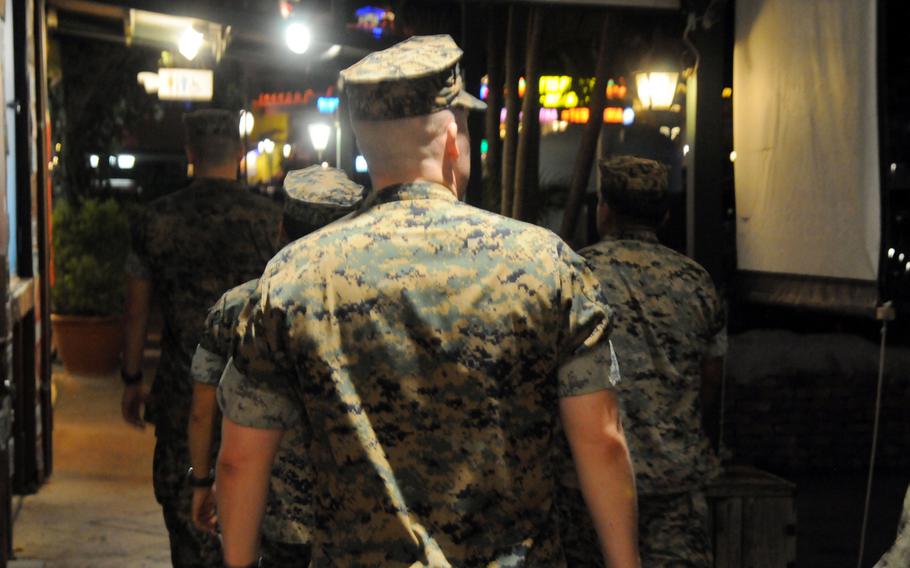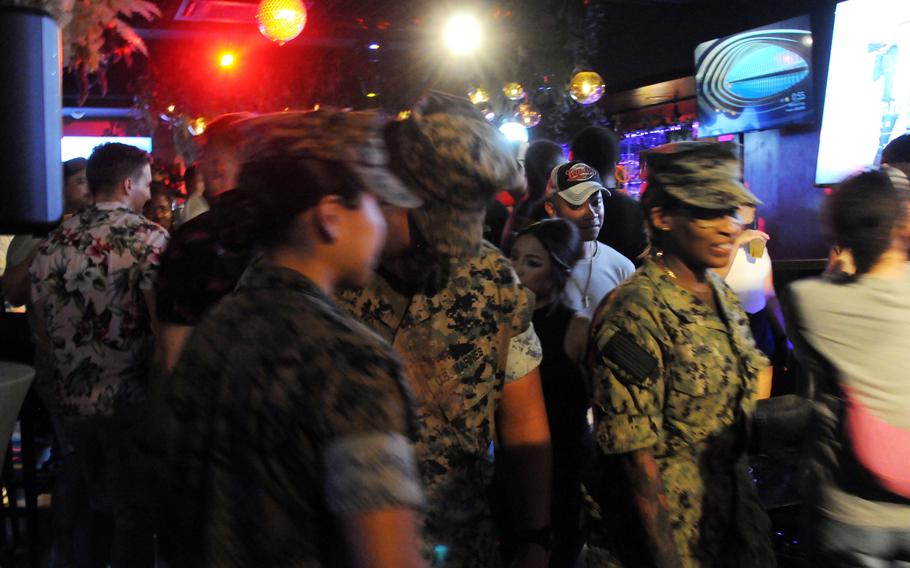Asia-Pacific
Sexual assault cases on Okinawa buck falling crime rate among island’s US troops
Stars and Stripes October 4, 2024

U.S. Marines patrol American Village bars in Chatan, Okinawa, Aug. 2, 2024. (Brian McElhiney/Stars and Stripe)
CAMP FOSTER, Okinawa — A modest spike in sexual assault cases against U.S. troops has again raised the specter of rape on Okinawa but data show it’s a sporadic, infrequent crime.
All categories of felony crime attributed to the U.S. military population on the island have fallen since Okinawa reverted to Japanese control in 1972, according to data obtained in August from the Okinawa Prefectural Police.
This year, two cases of sexual assault and one of attempted sexual assault pending in Okinawa courts have returned the island’s attention to that category of crime and revived the memory of a schoolgirl’s kidnapping and rape 29 years ago.
Police investigated a fourth case of alleged sexual assault this year that prosecutors decided not to pursue. The data indicate reports taken, not whether prosecutors filed criminal charges or obtained convictions.
The four cases are among at least six felonies alleged against the U.S. military population this year, the most reported against U.S. service members in 16 years. They buck a trend in declining crime rates on Okinawa going back 50 years.

U.S. Marines patrol American Village bars in Chatan, Okinawa, Aug. 2, 2024. (Brian McElhiney/Stars and Stripe)
“I do think that the general sort of noticeable decline over decades has to do with the U.S. armed forces taking these situations very seriously and trying to educate personnel,” said Marc Gallicchio, the Mary M. Birle chair in American History at Villanova University. “And I think cooperation with Japanese authorities also accounts for some of that.”
The number of felony incidents tend to fluctuate over time, with relatively few or none some years and sensational numbers in others, according to the police data. For example, police took five reports of sexual assault by U.S. personnel in the 2010s, down from 63 reports during the 1970s.
“I think that has to do with power dynamics,” said Gallicchio, a former Fulbright lecturer at the University of the Ryukyus in 2004 and 2005. “And I mean, it’s an issue within the military itself, so in some ways we shouldn’t be surprised that it’s occurring outside the military.”
In 2008, when reports of sexual assault last spiked, police took four reports against SOFA members.
Japanese criminal courts have jurisdiction over U.S. service members, Defense Department civilians, contractors and their families under the status of forces agreement, or SOFA, with the United States.
SOFA members constitute approximately 80,000 people, or about 5.5% of Okinawa’s population. Since 2020, SOFA members are suspected of having committed 1.5% of all offenses, not just felonies, on the island, according to the Okinawa police data.
Robbery is the most frequent felony offense recorded on Okinawa since 1972. Of 2,049 cases investigated by police, 400 – nearly 20% -- involved SOFA members.
Murder comes in third, with SOFA members involved in 27 reports, or 2% of 1,181.
Sexual assault, sometimes called rape and referred to as forcible sexual intercourse under Japanese law, is second during that period. SOFA members were involved in 140 reports, or about 9% of 1,555, according to police data.
Of those, the most notorious is the 1995 rape of a 12-year-old Okinawa schoolgirl kidnapped by two Marines and a Navy corpsman who were later convicted in a Japanese court. Its memory persists, especially when relations sour between the U.S. military and ordinary Okinawans.
Media attention surrounding the case possibly contributed to falling crime rates among U.S. service members, said Sara Kang, a Cotsen postdoctoral fellow and lecturer with the Council of the Humanities and History at Princeton University.
“That leads, I think, to important changes in the way that U.S. military personnel are expected to interact with women in particular,” she said by phone Sept. 26.